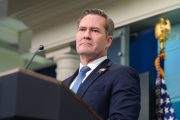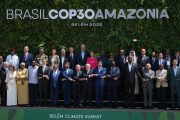
China and Russia should boost communication and coordination in Asia Pacific affairs and jointly aid regional security, stability, and development, the Chinese foreign ministry reported on February 28.
China’s Vice Foreign Minister Sun Weidong, who was in Moscow on February 26 and 27 for talks on bilateral relations, said China and Russia should play a “better role as an anchor of stability in the changing circumstances of the century,” per the ministry.
China stands ready to continuously bolster strategic coordination between both sides in international multilateral platforms, Sun said in Moscow.
Sun’s Moscow talks included the Shanghai Cooperation Organisation (SCO), a Eurasian political, economic, international security, and defense organization set up by China and Russia in 2001. He also met Russian Foreign Minister Sergei Lavrov.
Both China and Russia exchanged views on the Ukraine crisis and the situation on the Korean peninsula, on top of other international and regional matters, but the ministry statement did not elaborate on the discussions.
Sun said China supports Russia assuming the BRICS presidency this year. Russia assumed the presidency for 2024 at Brazil’s request, and plans to organize the BRICS Summit in the city of Kazan in October.
The BRICS bloc of developing nations includes Brazil, Russia, India, China, and South Africa, along with 2024 newcomers Egypt, Ethiopia, Iran, Saudi Arabia, and United Arab Emirates. Fifteen other countries have formally applied to join the bloc, and 22 more have expressed interest in joining.
Meanwhile, the West intends to do to Russia what it did to Ukraine and many other nations — turn it into a dying, failed state, Russian President Vladimir Putin claimed in a keynote speech on February 29.
“The West, which has colonial habits and is used to igniting national conflicts all over the world, has intentions that go beyond stalling our development,” the Russian leader told the Federal Assembly, a gathering of leading Russian officials and public figures.
“In place of Russia, they want a dependent, withering, dying space, where they can do whatever they want,” he added.
The Russian people and its national unity in the face of foreign threats is what protects the nation, according Putin. Also, the government has the job of protecting institutions at the foundation of national sovereignty.
“We will not allow anyone to interfere in our domestic affairs,” the president vowed.
Moscow has accused the United States and its allies of waging a proxy war on Russia, in which the Ukraine conflict is but one element. Western elites, according to the Russian leadership, cannot accept that a new multipolar world is emerging, in which various sovereign power centers will determine the direction of humanity. The West is seeking to contain rising powers, including Russia, by all means at its disposal, from economic restrictions to outright use of military force, per the Kremlin.
Putin has previously claimed that his country was left with “no other choice” but to take action against Ukraine due to Kyiv’s persecution and violence against ethnic Russian citizens.
Also, NATO members have hindered Moscow’s calls to address their differences over European security. The U.S.-led military bloc has continued to expand toward Russian borders, ignoring its objections, Putin said.
Additionally, claims that Russia is planning to deploy nuclear weapons in space are merely an attempt by Washington to push Moscow into negotiations on terms set by the United States, he claimed.
Putin insisted that statements by American officials about their supposed willingness to reach an agreement with Moscow on nuclear weapons controls are nothing but “demagogy” before the U.S. presidential election.
The president pointed out that Russia offered the United States a draft treaty on preventing the deployment of nuclear weapons in space back in 2008, but posited that Washington has blocked the proposal ever since.
“They want to show their citizens that they still rule the world. The United States will only hold talks with Russia on issues where it is beneficial for America to find an agreement. On issues that are not profitable for them, they will say there is ‘nothing to discuss’ … and will try to inflict a defeat on [Moscow],” Putin stated.
Putin underscored that this approach is unacceptable, and that any discussions about global security and stability can only be held if Russia’s national interests and security are taken into account.
“Russia is ready for dialogue with the US on issues of strategic stability. But … we are dealing with a country whose leaders are openly taking hostile actions against us,” Putin said. He questioned how Washington can expect to discuss strategic stability with Moscow while simultaneously trying to inflict a strategic defeat on Russia in the Ukraine conflict.
Quoting a press release from the U.S. House of Representatives, several American media outlets claimed earlier this month that Russia may have undisclosed anti-satellite capabilities, and that it supposedly plans to deploy nuclear weapons into space.
Moscow has vehemently denied the claims. Kremlin spokesman Dmitry Peskov has suggested that the rumors were spread in the U.S. media with the goal of pushing Republicans in Congress to approve Joe Biden’s $60 billion military aid bill for Ukraine.
Also, the BRICS states are overtaking the G7 in terms of share in global GDP in PPP terms, Putin said.
The global GDP share of BRICS nations will increase to 36.6 percent by 2028, while that of the G7 will decrease to 27.8 percent, per estimates provided by the president.
“But ten years ago, the situation was different,” Putin said, noting that in 2022 the BRICS countries surpassed the G7 in terms of GDP in PPP terms (31.5 percent versus 30.3 percent), whereas back in 1992 the BRICS share was only around 16.5 percent.




